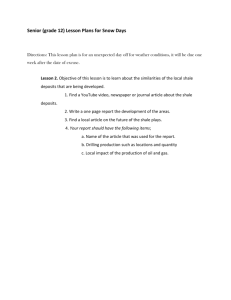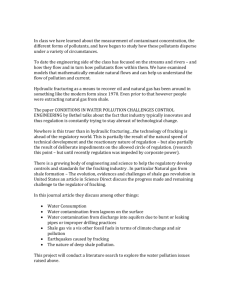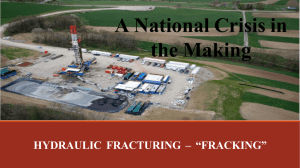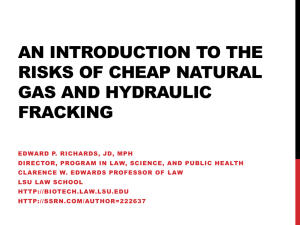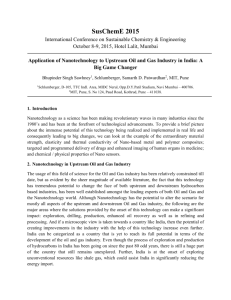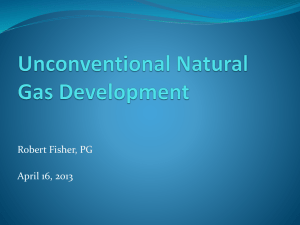There are many ways that shale gas and hydraulic fracturing could
advertisement
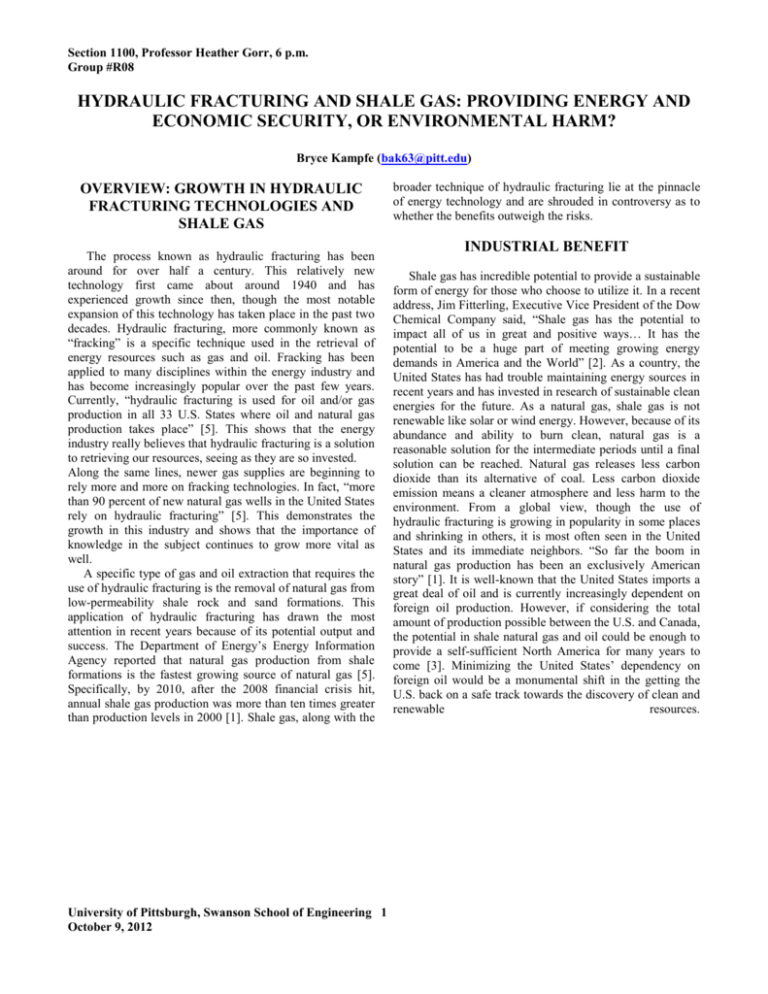
Section 1100, Professor Heather Gorr, 6 p.m. Group #R08 HYDRAULIC FRACTURING AND SHALE GAS: PROVIDING ENERGY AND ECONOMIC SECURITY, OR ENVIRONMENTAL HARM? Bryce Kampfe (bak63@pitt.edu) OVERVIEW: GROWTH IN HYDRAULIC FRACTURING TECHNOLOGIES AND SHALE GAS The process known as hydraulic fracturing has been around for over half a century. This relatively new technology first came about around 1940 and has experienced growth since then, though the most notable expansion of this technology has taken place in the past two decades. Hydraulic fracturing, more commonly known as “fracking” is a specific technique used in the retrieval of energy resources such as gas and oil. Fracking has been applied to many disciplines within the energy industry and has become increasingly popular over the past few years. Currently, “hydraulic fracturing is used for oil and/or gas production in all 33 U.S. States where oil and natural gas production takes place” [5]. This shows that the energy industry really believes that hydraulic fracturing is a solution to retrieving our resources, seeing as they are so invested. Along the same lines, newer gas supplies are beginning to rely more and more on fracking technologies. In fact, “more than 90 percent of new natural gas wells in the United States rely on hydraulic fracturing” [5]. This demonstrates the growth in this industry and shows that the importance of knowledge in the subject continues to grow more vital as well. A specific type of gas and oil extraction that requires the use of hydraulic fracturing is the removal of natural gas from low-permeability shale rock and sand formations. This application of hydraulic fracturing has drawn the most attention in recent years because of its potential output and success. The Department of Energy’s Energy Information Agency reported that natural gas production from shale formations is the fastest growing source of natural gas [5]. Specifically, by 2010, after the 2008 financial crisis hit, annual shale gas production was more than ten times greater than production levels in 2000 [1]. Shale gas, along with the University of Pittsburgh, Swanson School of Engineering 1 October 9, 2012 broader technique of hydraulic fracturing lie at the pinnacle of energy technology and are shrouded in controversy as to whether the benefits outweigh the risks. INDUSTRIAL BENEFIT Shale gas has incredible potential to provide a sustainable form of energy for those who choose to utilize it. In a recent address, Jim Fitterling, Executive Vice President of the Dow Chemical Company said, “Shale gas has the potential to impact all of us in great and positive ways… It has the potential to be a huge part of meeting growing energy demands in America and the World” [2]. As a country, the United States has had trouble maintaining energy sources in recent years and has invested in research of sustainable clean energies for the future. As a natural gas, shale gas is not renewable like solar or wind energy. However, because of its abundance and ability to burn clean, natural gas is a reasonable solution for the intermediate periods until a final solution can be reached. Natural gas releases less carbon dioxide than its alternative of coal. Less carbon dioxide emission means a cleaner atmosphere and less harm to the environment. From a global view, though the use of hydraulic fracturing is growing in popularity in some places and shrinking in others, it is most often seen in the United States and its immediate neighbors. “So far the boom in natural gas production has been an exclusively American story” [1]. It is well-known that the United States imports a great deal of oil and is currently increasingly dependent on foreign oil production. However, if considering the total amount of production possible between the U.S. and Canada, the potential in shale natural gas and oil could be enough to provide a self-sufficient North America for many years to come [3]. Minimizing the United States’ dependency on foreign oil would be a monumental shift in the getting the U.S. back on a safe track towards the discovery of clean and renewable resources. Bryce Kampfe fracturing. Much of this can be contributed to the fact that there is a lack of scientific studies which assess the practice of fracking and the risks that may be associated with it and the contamination of groundwater [5]. There may be select studies that attempt to identify the risks of fracking, but these are still too few in number to absolutely say that there are too many risks involved in the extraction of shale gas. Outside of the U.S. there have been more restrictions on hydraulic fracturing because of the possible harm it could cause to the environment. Several European countries have already banned fracking for such reasons [4]. Similarly, there have been a large number of complaints concerning earthquakes being caused by hydraulic fracturing. These concerns can, however, be discredited. Hydraulic fracturing does create minute seismic events, but these events, though they are technically “earthquakes” do not cause harm and are not even perceptible by sensitive geophysical instruments [3]. What is important to note is that hydraulic fracturing is not dangerous when it is done correctly. Though the numerous reports of methane gas leaking into public water supplies are a valid concern in the expansion of the industry of shale gas production, these instances can primarily be linked to human error. As Fitterling describes, “The science right now says that hydraulic fracturing— when done correctly— does not pose a significant risk to the environment” [2]. The practice of fracking is safe and, as long as the correct precautions are taken, there is much more benefit than risk in this discipline. ECONOMIC BENEFIT Many people have recognized the potential of shale gas in industrial terms, but few take note of the positive effects it could have on the U.S. economy [2]. There are many ways that shale gas and hydraulic fracturing could benefit the country. The consistent and reliable energy output is one of these benefits. Along similar lines, shale gas could also help provide the struggling U.S. economy with stability and growth [2]. It has been estimated that, over the next two to three decades, the United States economy could experience a growth as large as $2 trillion worth of new investments due to shale gas production alone [2]. Along with a boost in the economy, the production of natural gas by shale gas fracturing could also level out energy and gas prices in the U.S. for years to come. “There is increasingly widespread agreement among energy experts that the United States will enjoy moderate natural gas prices for decades” [1]. From a consumer’s point of view, the increasing production of natural gas from shale formations is good news. As long as production continues to increase without outside interruption due to restriction from legislature and other factors, shale gas promises to level out energy prices for considerable periods of time. However, there is also the possibility of natural gas demands rising before the supply reaches a level able to support such demands. Many factors, including large rises in demand for shale gas coming from new markets, such as natural gas automobiles, could send natural gas prices right back up [1]. Hopefully as an economy we take note of these possibilities and continue to utilize shale gas in the amount that we are able. SHALE NATURAL GAS VS COAL Since coal has been the most significant source of energy in the history of the world, it seems natural that new energy supplies should be continuously compared to coal. The cleanliness, or lack thereof, of coal-fired power plants has been well documented in recent history and most scientists would agree that natural gas is a much more environmentally healthy solution. “We know gas will eventually displace some coal in power plants… It’s more economical and produces less greenhouse gas emissions. It won’t replace all coal” [2]. To use specific statistics, “by early 2012, natural gas was providing 70 percent as much electricity as coal— up from barely more than 40 percent just a year before” [1]. The benefits of using natural gas over coal as an energy source are clear and can be seen in the difference of greenhouse gas emissions. “Switching from coal to gas lowers carbon dioxide emissions from power generation by 50 percent or more” [1]. These show that natural gas is an environmentally safer option than coal-powered energy. Though natural gas burns cleaner than coal and would produce much less volume of carbon dioxide, there is another greenhouse gas, methane, that has been known to leak from wells as a result of shale gas hydraulic fracturing. “Each molecule of methane traps far more heat than a molecule of carbon dioxide does, which means that small ENVIRONMENTAL CONCERN? There have been many complaints concerning the environment and its preservation linked to hydraulic fracturing and shale gas extraction. “Concern has emerged regarding the potential impacts that this process may have on groundwater quality and specifically on private wells and public water supplies” [5]. As the industry has expanded, so has the number of concerns surrounding the safety of natural gas production by shale extraction. “As exploration and production activities have increased and expanded into more populated areas, so has concern that the hydraulic fracturing process might introduce chemicals, methane, and other contaminants into aquifers” [5]. Though most public concerns that have been voiced deal with the actual process of fracturing and the contamination of groundwater sources, the more likely reason for contamination would come from human mistakes and errors. Specifically, drinking water can become contaminated from surface activities linked to shale fracturing. The careless disposal of drilling fluids, accidental spills, and leaky containment all increase the chances of nearby water wells becoming contaminated [5]. Though many citizens have voiced their opinions, little has been done to slow the process of expansion in hydraulic 2 Bryce Kampfe leaks can have big impacts on how much heat the atmosphere retains” [1]. However, though methane traps more heat than carbon dioxide, methane also has a much shorter atmospheric lifetime than carbon dioxide and therefore is limited in its ability to warm the planet [1]. If we can limit the frequency of accidental leaks and keep methane out of the atmosphere, we have a sure sign that shale gas is a safer bet than coal. This is an important statement when referencing the practice of hydraulic fracturing. There have been many reports of dangerous pollution of public drinking water and endangerment of populated areas because of shale gas extraction. This first list item already brings in to question the ethics behind fracking. In a similar fashion, the very next item on the code of ethics for engineers brings into question the involvement of different parties; government figures with no engineering background. The code reads, “Engineers shall: Perform services only in areas of their competence” [8]. I believe that this is an ideal citation to demonstrate why government involvement should be postponed. The members of Congress, in majority, do not have in-depth knowledge of engineering or what takes place in the natural gas fields. This is another reason why I feel that legislation should not be forced and that we as a society of engineers should take the lead in situations such as this, when we know best. POLITICAL CONTROVERSY There are a great number of questions regarding legislation on hydraulic fracturing and whether or not it should be made stricter. Many people believe that Congress needs to act and restrict the actions of the natural gas industry because the process itself is to blame for such controversy. “It is the rapidly increasing and geographically expanding use of hydraulic fracturing, along with a growing number of citizen complaints of groundwater contamination and other environmental problems attributed to this practice, that has led to calls for greater State and/or Federal environmental oversight of this activity” [5]. However, many industry leaders feel that the controversy in fracking does not lie in the oil and gas fields, but instead in U.S. Congress and the Environmental Protection Agency [3]. “Groups opposed to oil and gas— and therefore anything that promises to make oil and gas more abundant— created controversy in those places” [3]. In a recent article from Congressional Digest, it was said, “Industry representatives argue that additional Federal regulation is unnecessary and would likely slow domestic gas development and increase energy prices” [5]. With higher energy prices a direction that no one in the United States would encourage, it is up to the citizens and Congress to decide whether or not heavier regulations will be placed on the shale gas industry. I would venture to agree with the current heads of the natural gas industry and say that extensive government involvement and restriction in this area would only slow shale gas production. Congress should wait and see the potential benefit of allowing gas production to fluctuate based on economic trends and not restrict it with legislation for the time being. WORTHWHILE EDUCATIONAL EXERCISE I think that the process of undertaking research and formulating a well-developed presentation of this research is an ideal activity for all students in every discipline of engineering. Even outside of engineering, taking the time to compile knowledge gleaned over weeks of hard work onto one final piece is a valuable exercise. This shows that rough data can be transformed and presented into a clean, welldeveloped demonstration of effort. CLOSING REMARKS To conclude, I would like to simply restate that, though hydraulic fracturing is surrounded with questions and controversy, the practice of extracting shale gas by this method has yet to produce traumatic results and has the potential to provide a stable source of energy and financial growth for a country in need of such things. If we continue to produce research and hold off congressional involvement for the time being, I can see this potential coming to fruition in the near future. The politics and questions regarding ethics will take time to subside, but they will. As Dr. Fitterling describes it, “Stick to the science.” ETHICAL BEHAVIOR I have already mentioned the controversy that dances around the topic of hydraulic fracturing. This controversy can be linked to the questions left open in areas such as ethics. Practicing ethical behavior means that everyone that may be impacted by a single decision is taken into account and treated with the highest respect and dignity. In the National Society of Professional Engineer’s Code of Ethics, the first item listed under the first section heading of “Fundamental Canons” reads, “Engineers shall: Hold paramount the safety, health, and welfare of the public” [8]. REFERENCES [1] M. Levi. (2012). “Splitting rock vs. splitting atoms: What shale gas means for nuclear power.” Bulletin of the Atomic Scientists. (Online article). http://web.ebscohost.com/ehost/pdfviewer/pdfviewer?sid=4d 286a50041844a09824c5bdc964f1f9%40sessionmgr111&vid =4&hid=127. [2] J. Fitterling. (March 28, 2012). “Shale Gas: Energy 3 Bryce Kampfe Security for the Americas…or a Cautionary Tale of Bad Decisions?” Vital Speeches of the Day. (Online article). http://web.ebscohost.com/ehost/pdfviewer/pdfviewer?sid=4d 286a50041844a09824c5bdc964f1f9%40sessionmgr111&vid =5&hid=127. [3] B. Tippee. (November 10, 2011). “Shale: Politics vs. Opportunity.” Vital Speeches of the Day. (Online article). http://web.ebscohost.com/ehost/pdfviewer/pdfviewer?sid=4d 286a50041844a09824c5bdc964f1f9%40sessionmgr111&vid =6&hid=127. [4] B. Walsh. (May 21, 2012). “The Golden Age.” Time Magazine. (Print article). [5] (March, 2012). “Hydraulic Fracturing Overview: Growth of the Process and Safe Drinking Water Concerns.” Congressional Digest. (Online article). http://web.ebscohost.com/ehost/pdfviewer/pdfviewer?sid=4d 286a50041844a09824c5bdc964f1f9%40sessionmgr111&vid =4&hid=127. [6] K. Galbraith. (March 25, 2011). “Hydraulic Fracturing Bill could Force Disclosure.” The New York Times. (Print article). [7] “Code of Ethics.” American Institute of Chemical Engineers. (Online article). http://www.aiche.org/about/code-ethics. [8] (July 2007). “Code of Ethics for Engineers.” National Society of Professional Engineers. (Online article). http://www.nspe.org/Ethics/CodeofEthics/index.html. [9] E. Marrocu, R. Paci. (October, 2012). “Education or Creativity: What Matters Most for Economic Performance?” Economic Geography. (Online article). http://apps.webofknowledge.com/full_record.do?product=W OS&search_mode=GeneralSearch&qid=2&SID=1BPnaIMn lNfDlKOIgOK&page=1&doc=5. ACKNOWLEDGMENTS I would like to say thank you to the writing staff for giving such detailed instructions on the completion of this assignment. Also, I would like to thank the librarians and my professor for helping me to find valid information and decide on a topic that truly interested me. Thank you for taking the time to read and consider my thoughts. 4
